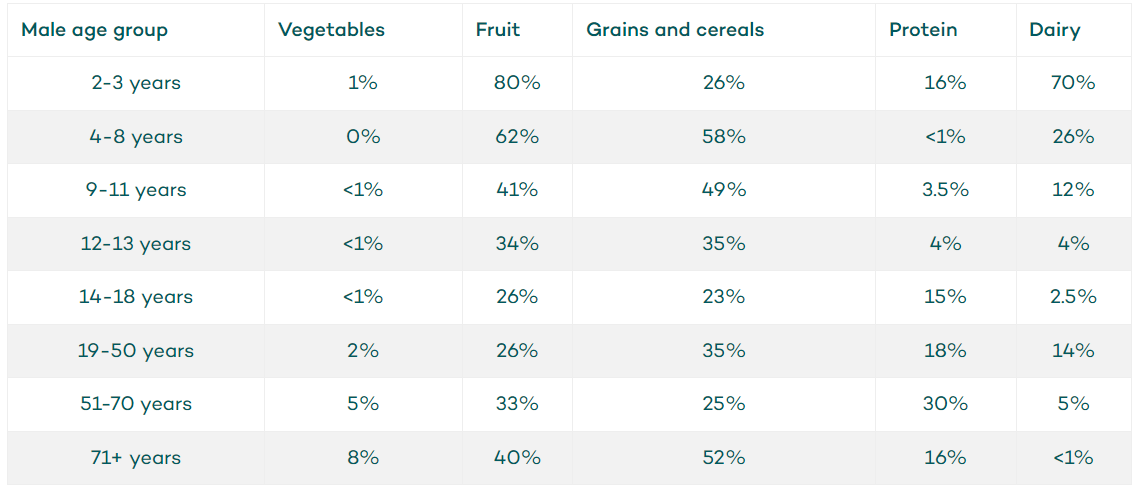Medically reviewed by
What is healthy eating?
Healthy eating means having enough healthy food and drinks in your diet, but not eating too much.
It also means eating a wide variety of healthy foods and avoiding unhealthy foods and drinks.
Your diet provides the energy your body requires to do all the things it needs to do — like breathing, pumping blood, thinking, healing, fighting infections and moving around.
The energy in your diet comes from macronutrients — proteins, fats, carbohydrates, fibre, organic acids and alcohol — and the right balance of these is needed to keep you healthy.
Your diet might provide more than your body needs to function well, or things it doesn’t need at all, which can result in health problems.
For example, excess energy in your diet can be converted to fat that causes obesity, or alcohol can cause damage to your liver and other organs.
There’s no one-size-fits-all diet that is suitable for everyone. Many people have health conditions that affect the foods they can eat.
You may need to seek individualised advice from an Accredited Practicing Dietitian or your doctor to match your diet to your health needs.
What is a balanced diet?
The Australian Dietary Guidelines provide advice about the amounts and types of foods that you should eat for a balanced diet to help you stay healthy.
They are based on scientific evidence about the nutrient and energy needs of people at different ages and stages of life.
Macronutrients from different food sources are not all the same.
For example, unprocessed foods provide carbohydrates in a healthier form than highly processed foods, and a Mediterranean-style diet with around 40% fat (mainly from plants and fish) may be better for your health than a diet with 30% fat from other sources (like dairy and red meats).
Which foods, and how much of them, should I eat?
The Australian Dietary Guidelines break down a healthy diet into five food groups and recommend the number of servings from each group you should eat each day.
The five food groups, and examples of one serve, are:
What should adults eat each day?
In servings:

What should babies eat?
For most babies, breast milk or infant formula is the only food they need for the first six months after birth.
At six months of age, breastmilk or formula should be supplemented by other foods (such as iron-enriched cereals and pureed food).
By 12 months of age, children should be eating a wide variety of foods from the five food groups.
Subscribe to our newsletter

What should children eat each day?
In servings:

What should I drink?
Your body is mainly made of water, and it needs water to function properly. You lose water from sweating, breathing and urinating, so you need to replace it.
You get some water from the food you eat, but the best way to replenish the water you lose is by drinking water.
All drinks provide water but the other things they contain (e.g. caffeine, sugar, flavours, alcohol) are unnecessary and potentially harmful.
The amount you need to drink depends on things like your age, sex, size, body composition, level of activity and your environment.
Which foods should I avoid?
Around one-third of the energy intake of Australians comes from unnecessary foods that have high levels of things that are bad for you if you have too much (e.g. sugar, unhealthy fats, salt) and low levels of what we need (e.g. healthy fats, fibre, protein).
The Australian Dietary Guidelines recommend that unnecessary foods should be eaten only sometimes and in small amounts.
How common is healthy eating?
Very few Australians have diets that meet the Australian Dietary Guidelines. These percentages indicate how many men and boys eat enough of:

Eating and health
Unhealthy eating is responsible for 6.6% of the burden of disease that affects Australian men and boys, costing more than 170,000 years of healthy life (for comparison, tobacco smoking is responsible for 9.2% of total burden of disease in Australian males and a lack of physical activity is responsible for 2.4%).
Alcohol consumption is responsible for an additional 6.1% of the burden of disease in Australian males.
Following the Australian Dietary Guidelines is one of the most important things you can do to lower your risk of these diseases.
Your diet can also affect your fertility, and there are links between fathers’ nutrition and the health of their children.
Eating disorders in men and boys
Eating disorders are serious mental illnesses that can affect anyone at any time in their life. Around one-third of Australians with an eating disorder are male.
Body dysmorphic disorder is different from an eating disorder, but both may occur in some people.













